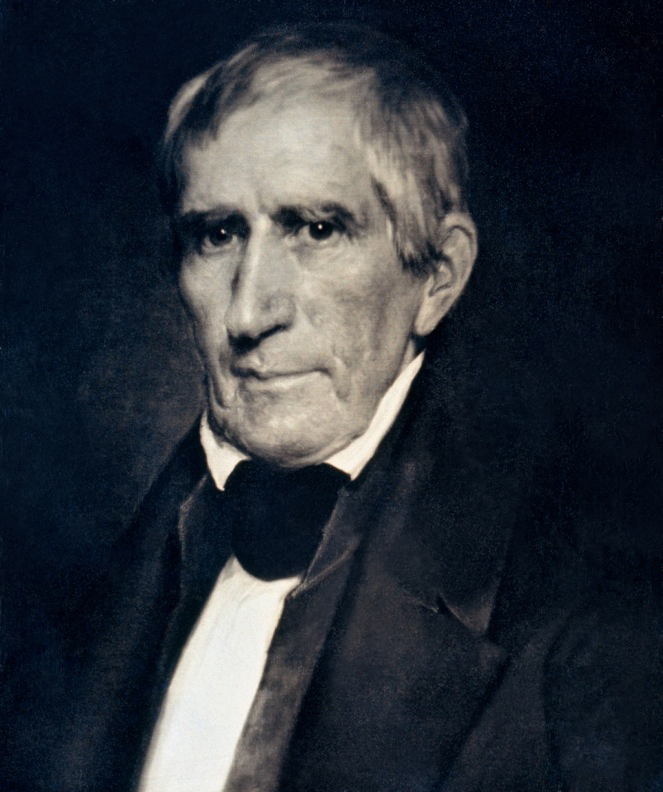William Henry Harrison was the ninth president of the United States (1841) and the first to die in office.

Born in Virginia on February 9, 1773, William Henry Harrison became the ninth president of the United States in 1841. Elected at age 67, he was then the oldest man to take the office, and became the first U.S. president to die in office. His one-month tenure was the shortest. His father, Benjamin, was a signer of the Declaration of Independence, and his grandson, also Benjamin, became the 23rd president.
Early Years
William Henry Harrison was born on February 9, 1773, on a Virginia plantation. He was born into a well-connected family who had deep roots in the “planter aristocracy.” (His father, Benjamin Harrison, signed the Declaration of Independence and was a member of the Continental Congress. His brother, Carter Harrison, served in the U.S. House of Representatives.) Harrison studied classics and history at Hampden-Sydney College and then studied medicine in Richmond with another co-signer of the Declaration of Independence, Benjamin Rush.
In 1791, Harrison changed career paths, joining the First Infantry of the Regular Army and heading to the Northwest. He served under General Anthony Wayne in his struggle against the Northwest Indian Confederation, which culminated in the Battle of Fallen Timbers (August 1794)
Government Service
Harrison left the army in 1798 and held various government jobs before being named secretary of the Northwest Territory–a huge tract of land composed of most of the future states of Ohio, Indiana, Illinois, Michigan and Wisconsin–by President John Adams in 1798. As the territory’s first congressional delegate, Harrison helped obtain legislation that divided the land into the Northwest and Indiana territories, the latter of which he served as governor of from 1801 until 1813.
As governor, Harrison oversaw the efforts to gain access to and control of Indian lands so settlers could extend their presence and establish new territories. The Indians usually resisted the process, so it became Harrison’s task to defend the fledgling settlements.
Indian Campaigns and the War of 1812
In 1809, the native populations became fierce in their resistance. They were led by Tecumseh, who proved to be a tenacious adversary. In 1811, Harrison received permission to attack Tecumseh and his confederacy, but before he could fully proceed, on November 7, the Indians attacked Harrison’s camp on the Tippecanoe River. Harrison and his men repelled the attacked but sustained 190 dead and wounded. The stand at Tippecanoe would do little to stem the Indian revolts, but it would serve as a touchstone for Harrison and his future political career. (The call for “Tippecanoe and Tyler too” would echo throughout his and running mate John Tyler’s 1840 campaign, becoming the most famous political saying in U.S. history).
During the War of 1812, Harrison further built his reputation commanding the army in the Northwest, defeating the British and Indian forces and killing Tecumseh at the Battle of the Thames, north of Lake Erie. This sent the Indians scrambling for good, and their presence in the region would never again pose a threat.
Presidency and Sudden Death
With the War of 1812 behind him, William Henry Harrison returned to Ohio and settled into government life. He served in the U.S. House of Representatives from 1816 to 1819, the Ohio Senate from 1819 to 1821, and the U.S. Senate from 1825 to 1828. In 1836, he ran (as a Whig) for the presidency, but lost to Democrat Martin Van Buren. He was successful enough, however, to return in 1840, this time winning the popular vote by a thin margin (fewer than 150,000 votes separated him and Van Buren), but taking the Electoral College easily (234 to 60).
Harrison thereby became the oldest person elected president of the United States and the last to be born while the United States was still under British rule. Unfortunately, he caught a cold around the time of his inauguration, and it developed into pneumonia.
On April 4, 1841, William Henry Harrison died in the White House, before his wife had even moved to Washington, D.C. to become first lady. Harrison was the first president to die in office. His grandson, also Benjamin, born in 1833, would become the 23rd president of the United States in 1888.
• William Henry Harrison was an American military officer and politician who served as the ninth president of the United States in 1841. He died of typhoid, pneumonia or paratyphoid fever 31 days into his term, becoming the first president to die in office.
• Born: February 9, 1773, Berkeley Plantation, VA
• Died: April 4, 1841, The White House, Washington, D.C.
• Presidential term: March 4, 1841 – April 4, 1841
• Vice president: John Tyler (1841)
• Children: John Scott Harrison, William Henry Harrison Jr, MORE
• Nicknames: General Mum, Van Ruin, Old Tippecanoe, Tippecanoe, Old Granny, The Cincinnatus of the West, Washington of the West
• First president elected as a Whig to the presidency.
• First president from Ohio.
• First president to have 10 or more biological children.
• First president to be born in the same county as his vice president.
• First president to not appoint anyone to the Supreme Court
• First president to not issue an executive order
• First president to give an inaugural address of more than 5,000 words.
• First president whose grandson (Benjamin Harrison) was also a president.
• First president to have his photograph taken while in office.
• First president to be over the age of 65 upon entering office.
• First president to die in office.
• First president to have been a brigadier general.
• First president to serve as ambassador to a South American country, having served as United States minister to Gran Colombia from 1828 to 1829.
